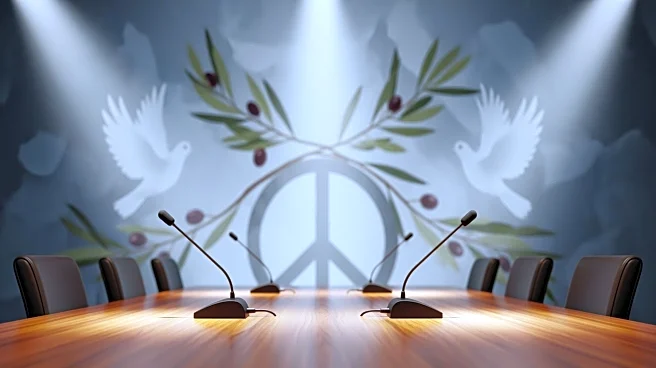What's Happening?
Israeli Prime Minister Benjamin Netanyahu has lauded the UN Security Council's approval of President Trump's plan for Gaza, which includes deploying an international stabilization force. The plan, part
of a 20-point proposal, aims to secure Gaza and facilitate humanitarian assistance. While Netanyahu praised Trump's diplomatic efforts, he avoided addressing the resolution's clause on Palestinian statehood. The plan has sparked mixed reactions, with Hamas rejecting the international guardianship mechanism and refusing to disarm. The resolution is seen as a step towards consolidating the ceasefire and advancing a two-state solution, though significant challenges remain.
Why It's Important?
The UN's endorsement of Trump's Gaza plan represents a pivotal moment in the Israeli-Palestinian conflict, potentially reshaping regional dynamics. Netanyahu's support for the plan highlights Israel's strategic interests in stabilizing Gaza and reducing Hamas's influence. However, the avoidance of Palestinian statehood discussions underscores ongoing tensions and the complexity of achieving a lasting peace. The plan's success depends on international cooperation and the willingness of regional actors to contribute to the stabilization force. The resolution's focus on humanitarian aid and conflict resolution reflects broader efforts to address the humanitarian crisis in Gaza and promote peace.
What's Next?
The next phase involves implementing the stabilization force and coordinating humanitarian assistance with neighboring countries. The international community, including Arab and Muslim-majority nations, will play a crucial role in supporting the plan's objectives. The resolution's emphasis on a political process towards a two-state solution requires continued diplomatic efforts and negotiations. The involvement of countries like Indonesia and Egypt in the peacekeeping force could enhance the plan's legitimacy and effectiveness. The plan's progress will be closely monitored, with potential adjustments based on the evolving political and security landscape.









